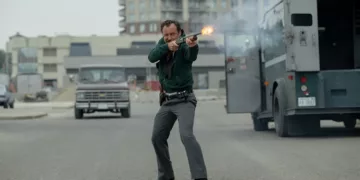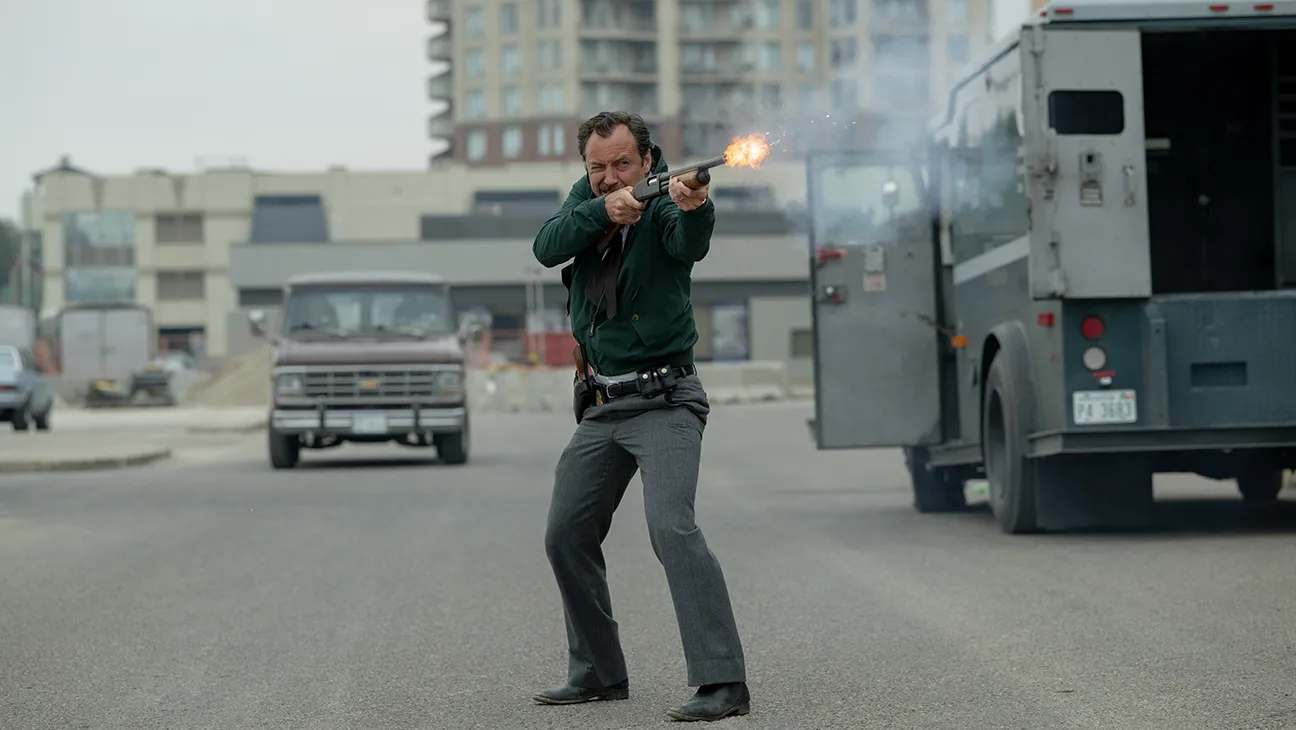Justin Kurzel dives into dark true stories about violence with films like Snowtown Murders and Nitram. In The Order, he shares another disturbing slice of reality—this time from America in the 1980s. The movie follows an FBI agent tasked with hunting a dangerous new white supremacist group that’s emerged in the Pacific Northwest.
Lead by a charismatic young man named Bob Mathews, this militant fringe breaks off from a larger far-right church organization. Now going by the name “The Order,” they aim to accelerate the extremist agenda through armed terrorism instead of just words. Robbing banks and setting off bombs, their attacks escalate—soon placing them in the crosshairs of a veteran FBI investigator named Terry Husk.
Played by Jude Law, Terry has faced the KKK and mob before. But this Neo-Nazi cell will be one of his toughest targets yet to track down in the dense forests and mountains of Idaho. Working with local police, he slowly unravels their plans, showing scenes of tense action and violence.
The film debuted at the prestigious Venice Film Festival, hinting this may offer more than your standard crime thriller. By glimpsing the roots of hate behind a shocking real case, Kurzel shines a light on issues still relevant today. So strap in for a gripping cat-and-mouse chase through the shadows of America’s not-so-distant radicalized past.
Grizzled G-Men and Their Fanatical Foes
At the center of it all is Terry Husk, played compellingly by Jude Law. As a veteran FBI man, Terry’s seen it all before—but the hate group he now hunts will be his most difficult target. Still reeling from failures in his past, Terry pours every ounce of himself into the job. It’s easy to see why too, with his marriage crumbling and health starting’ to go. But beneath the grizzled exterior beats a heart dead-set on justice.
On the other side is Bob Mathews, brought to chilling life by Nicholas Hoult. With boyish looks and a silver tongue, Bob rallies angry young men to his cause. He dreams of an all-white nation cleansed of “inferiors” through whatever means necessary. And his growing band of fanatics—called The Order—will stop at nothing to fund Bob’s twisted vision.
Helping Terry is a cop named Jamie, played sincerely by Tye Sheridan. Eager but inexperienced, Jamie looks to Terry for guidance as they wade into the darkness. And no stranger to darkness herself is Jurnee Smollett’s FBI agent—a battle-hardened woman who knows Terry’s driven nature could also be his undoing.
While the characters depict real folks from history, some license is taken for the story. But Law, Hoult, and the rest make these lawmen and lawbreakers feel truer than any headlines could. Their turbulent waltz kept me glued to the screen, wrestling with questions of humanity’s capability for good and evil.
Gritty Graft: Kurzel’s Skilled Direction
Justin Kurzel knows his way around a thrilling action scene, crafting tense moments with realism and force. In The Order, he unleashes crisp, gritty sequences that had me on edge from start to shocking finish. Whether ferocious fights or high-speed getaways, Kurzel brings these dangerous situations to life with stomach-churning intensity.
But it’s not just pulse-pounding prowess—the Aussie auteur makes you feel the humanity in each character, even the hateful ones. As the unhinged leader Bob, Nicholas Hoult delivers depths far past some ’80s baddie one-note villain. And what a performance opposite—Jude Law owning every scene as the shattered soul driving this manhunt. Beyond grizzled looks, Law injects Terry with full, shuddering humanity even in his darkest moments.
Top-notch production gives this true tale an authentic thrash. Cinematographer Adam Arkapaw coats the Northwest forests and remote towns in a bleak mustard tone that sinks you right in the era. While costume designer Annie Murphy dresses characters in down-home layers fitting their simple lives, from plaid-wearing cops to home-cooked meals. Together, the visuals immerse us in this chilling chunk of America’s not-so-distant past.
With a keen directorial scalpel and stellar casts, Justin Kurzel continues proving himself a master of gritty true crime. In The Order, he brings to life a harrowing story that’ll burrow under your skin long after its thrilling final frame fades to black.
The Echoes of Hate – And How We Track Its Roots
The Order follows two tense tales unfolding side by side. One shows a band of fanatics plunging deeper into a hell of their own making. Led by the chilling Bob Matthews, the group called The Order pulls off ever bolder crimes to fund their disturbing dream of a whites-only nation.
Meanwhile, the other yarn follows a team of lawmen tracing The Order’s tracks. Veteran FBI agent Terry Husk spearheads the hunt, relentless as a hound on a scent. Helping is eager rookie Jamie Bowen plus Terry’s old partner Joanne. Step by painful step, they draw closer to exposing the cell’s sinister scheme.
Under the surface, there are echoes between Terry and Bob. Both men drive themselves to extremes in bloody-minded pursuit of a cause. Whether out of screwed-up ideals or duty to serve and protect, each has let obsession consume their lives.
There are echoes beyond the story too. The group finds inspiration in a book titled The Turner Diaries, a disturbingly popular text forecasting a coming race war. Reading like a how-to for terrorists, its ugly visions seem to foretell real tragedies—from attacks the FBI investigated to assaults on democracy itself.
But where some films might pull apart the psychology of hate, The Order keeps its focus narrow. It cares less about decoding radicals’ minds than showing step-by-step how an investigation unfolds. Granted, this procedural view brings gritty realism. But it leaves lingering questions about what fuels the fanaticism still threatening society today.
In the end, The Order delivers a suspenseful genre yarn that holds attention. Yet for all its mirroring of America’s disturbing past and present, the film seems to reflect our real world only on a surface level. Perhaps by delving deeper into hate’s murky roots, it could have offered more unsettling revelations about where those roots may still spread.
Murphy’s Law and Cold Pursuits
Some scenes had me clutching my seat—like a nail-biting bank job prologue showing these guys meant serious business. And an armored car hijacking through some mountain roads is a white-knuckler, shotguns suddenly splitting the serene scenery. You feel the pressure as it all could implode in an instant.
Knowing this wild game of cops versus robbers played out for real gives it an extra chill. When shotgun blasts ring out, a sense of dread creeps in when picturing those tragic 80s headlines. And it lingers as you leave the theater, unsettled; these toxic seeds planted long ago still haven’t all been rooted out.
At one point, Law has a rifle trained on some woods, waiting to bag an elk, but it slips away unharmed. Could this foreshadow his quarry, this militant cell’s leader, also remaining elusive no matter how close he draws his sights? Their tentative tango keeps you hooked right until the grim finale’s cards remind you what inspiration still fuels disturbed minds today.
Throughout it all, Kurzel keeps you feeling every bang and pursuit like a punch to the gut. When the dust settles, it leaves you contemplating all the murky threats bubbling beneath America’s surface even decades later. And how those blinded by hate can wreak havoc when we least expect, like the law of unintended consequences made flesh.
Flawed Extremists
While The Order kept me hooked, some parts felt like missed opportunities. Bob Matthews, played terrifically by Hoult, never quite becomes the truly terrifying figure a story about hate demands. The leader of dangerous terrorists should chill you to your core. Instead, Bob comes across as a sadly misguided man rather than pure evil.
Elsewhere, strong female characters get pushed to the sidelines. With so much focus on damaged male egos, richer perspectives could have come from women affected by this world of extremism. More dimension from the few female roles may have deepened the dark issues explored.
Repeating a fixation on white male violence seen in earlier works, Kurzel risks growing stale tackling such topics again here. A fresher lens examining radicalization’s roots could have unearthed deeper insights.
A comedic interlude where Terry is quizzed on fatherly feelings also feels jarringly out of place. The film works best grappling with humanity’s shadows, not its lighter sides. Removing that tonal clash would streamline an otherwise taut tale.
While constantly compelling, these niggles suggest untapped potential in Kurzel’s proven skills. Delving deeper into psyches on both sides of hate and crafting ever more multifaceted characters could strengthen future forays into reality’s roughest terrain.
Closing the Book on Hate
By the final frame, The Order grips you with its cat-and-mouse chills despite some flaws. Kurzel directs shockingly real action and elicits terrific performances, exposing humanity in all its shades. His craft brings this dark saga to pulse-pounding life.
Still, to fully shine a light on radicals’ roots, one hopes Kurzel’s lens continues evolving. Broader views exploring what nurtures hate and how to outgrow it could strengthen future fare. Delving deeper may heighten realism and offer food for thought long after credits roll.
Of course, revisiting this substantive slice of America’s disturbing past remains utterly absorbing. Its reminders that closed chapters can reopen are sobering needed now as ever. And its clues to comprehending radicalization’s allure, however partial, lend valuable perspective.
In the end, The Order grasps as a propulsive procedural. But it hints Kurzel’s superb gifts could excavate darkness’ wellsprings even more profoundly. Perhaps further expanding empathy will bring his notable skills to brighter bear on societies’ most shadowy recesses. For gripping audiences with real lives’ rough ride, this tale remains a tour de force.
The Review
The Order
The Order is a taut true-crime thriller elevated by gritty direction and strong performances, though it could have probed deeper into the roots of hate.
PROS
- Authentic portrayal of a dark period in history and a real FBI manhunt
- Well-crafted action sequences with intense direction of violence
- Compelling lead performances from Jude Law and Nicholas Hoult
- Immersive setting of the 1980s Pacific Northwest through production design
CONS
- Villain lacks the true menace expected of a terrorist leader.
- Underdeveloped side characters, especially female roles
- Direction feels repetitive of Kurzel's focus on white male extremists.
- Opportunity to examine radicalization more deeply is partly missed.


















































Discussion about this post